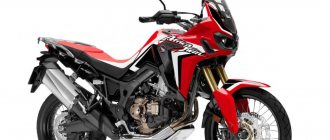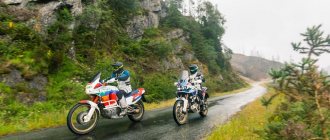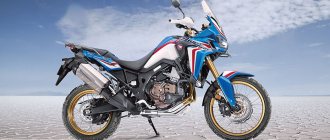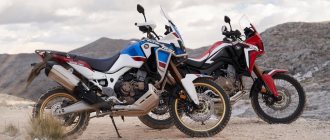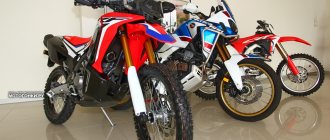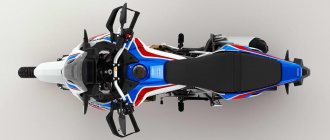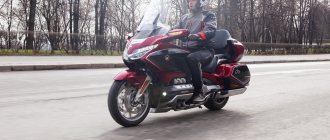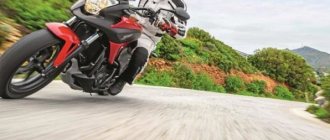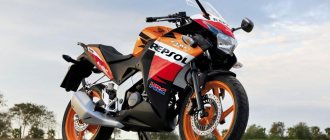Appearance
Honda CRF 1000L Africa Twin looks impressive. This is a large motorcycle, mostly black. The seats for both driver and passenger are comfortable and made of quality materials. There is no cheap plastic or low-budget equipment to be seen anywhere. Considering the cost, nothing like this should be here.
The wheels here are spoked. It is immediately obvious that this is a heavy motorcycle, taking into account the dimensions of the frame. Based on the ground clearance, it is clear that the element of this bike is off-road. The front wheel is large, and therefore on mountain passes (on the highway) this car is inferior to many other models. But for rough terrain this is a plus.
There is no other like it
The Honda Africa Twin motorcycle, frankly speaking, is not entirely unambiguous, because its suspensions make it much more suitable for off-road driving than on asphalt surfaces. It doesn’t have such common features as electric suspension adjustments, and it doesn’t even have cruise control, which is considered mandatory for all touring motorcycles.
However, he has things that no one else can offer. This is an automatic transmission, this is a liter, very high-torque engine and the same DNA of the good old Honda Africa Twin, it really is here. She hasn't gone anywhere.
Comfort
The only thing that will be “uncomfortable” for many is the cost of the bike. About 900 thousand Russian rubles - that’s how much such a car costs. And no wonder: this is a durable bike for any occasion, designed to cover thousands of kilometers across dozens of countries and different latitudes.
According to the description of those who have already traveled a lot on this bike, spare parts are not difficult to get, but repairs are rarely required. So no one complains about the service here. This enduro touring bike is perhaps the most reliable bike in the world today.
Dimensions and weight
The car is well suited for off-road driving, but at the same time it has large dimensions. The latter make the equipment stable, for example, on a highway somewhere in the steppe. In such conditions, strong winds can tilt and drop even a light cruiser. But unless there's some kind of weather disaster involved, this bike will take a beating.
Dimensions:
- tank - 18.8 l;
- ground clearance – 250 mm;
- curb weight – 232 kg;
- height – 1475 mm;
- width – 930 mm;
- length – 2335 mm;
- seat height – 870 mm.
Taking into account fuel consumption, this car is convenient to operate. This is how it should be when using a touring enduro. The dimensions are chosen ideally so that this equipment becomes a reliable companion on a long journey for one or two people. It's hard to imagine a better enduro tourer.
TEST DRIVE: Honda CRF1000D Africa Twin – Freedom of choice
The big Russian question: helpful German women or hardworking Japanese women? Provocation. The Honda CRF1000 Africa Twin has caused the most controversial impressions among netizens. After sitting in the new “Africa” at the Honda presentation, my hands were just itching - I’d like to rush it somewhere and drive off the road.
MOTOGONKI.RU, September 13, 2016 —
EICMA-2015: Pictures from the exhibition - Honda CRF1000L Africa Twin MY16 Click on the image to
go to the photo gallery
First impressions of the Honda CRF1000L Africa Twin left no doubt: this is, in any case, an outstanding new product. For how many years Honda wanted to return to the market of large full-fledged enduros, and not trendy “style” road bikes. It’s enough to go back to the test drive of the Honda VFR1200X Crosstourer, which we did in the winter of 2012 in Spain: it seems that everything is with it, and there is a DCT, and a large one. But as soon as we left the asphalt, nuances immediately emerged that were not worthy of a full-fledged crossover. All this time, from 2012 to 2015, work was in full swing at Honda - to make an ENDURO, but competitive and fast at the same time.
Test drive Honda CRF1000D Africa Twin Click on the image to go to the photo gallery
The moment of deep study of Africa Twin has come, almost a year after that first meeting in Milan. And precisely with an automatic transmission – CRF1000D. If you are interested in purely technical nuances, then here you go: description, technical characteristics and features of the Honda CRF1000L Africa Twin (2016)
. Below will be a purely driving test drive, without delving into the performance characteristics. And perhaps I will repeat the words said during the tests of the VRF1200FD and Crosstourer. Well, it turns out: similar habits!
Instead of introducing
Before we talk about the Africa Twin as a motorcycle, we need to understand the essence of the phenomenon - why did Honda make such a bike in the first place; what they wanted to achieve by releasing a huge 2-cylinder in-line engine with 95 hp, and even with DCT (Dual-Clutch Transmission). For me personally, this is not a question, since I experienced the whole DCT feature back in 2011. But the bewilderment on their faces can still be read to this day.
EICMA-2015: Pictures from the exhibition - Honda CRF1000L Africa Twin MY16 Click on the image to go to the photo gallery
All the excess power here goes to soften the characteristics. They could make a motorcycle that would travel 250 km/h and jump over sewers at the same speed, but how comfortable would the ride be then, and how much energy and body movements would the pilot have to exert?
The engine power is enough to easily lift the motorcycle in 6th (!) gear even from 20 km/h. Yes, at the same time it will tense up “slightly”, but the computer will never allow the engine to block. In real life, blocking a large engine is just as easy as blocking a small one. And you can get the opposite effect from careless handling of the gas, a transition to uncontrolled rotation of the rear wheel. Both are important for those who have just joined the “1000+ Club”.
Honda plays in the league where 100 hp. - the upper limit for newcomers to the “liter” class in Europe, and this is a gigantic army of customers! And in Russia there are enough of them. And Honda is betting that these customers will live longer and spend more time in the saddle.
Test drive Honda CRF1000D Africa Twin: to find such beautiful places, climb to the top of the hill, you need to go off the road Click on the image to go to the photo gallery
At the same time, Honda leaves the full potential of enduro to the experienced: disabling electronic assistants - ABS, traction control, switching to manual mode with the gearbox - no problem, go for it!
What does Honda have that others don't?
Significantly improved DCT since 2010. But the Africa Twin has a little more than this heritage: a new chassis and engine, both of which are no less masterpieces than the DCT.
Test drive Honda CRF1000D Africa Twin: an engine with DCT is difficult to confuse with any other! Click on the image to go to the photo gallery
I don't know how much the Africa Twin weighs, but the bike is extremely easy to ride, fast on the highway, and the sound of the 2-cylinder in-line engine with a crank angle of 270° is impressive - like riding a V-Twin. This is exactly the idea that Honda's R&D engineers in Kumamoto pursued: to give the driver the same driving experience as the old XRV750 Africa Twin, produced from 1996 to 2003.
The advantage of the “row” is that it is much more compact, and the sound of its exhaust and vibrations can be manipulated. Honda succeeded in creating the roadster sound. Sometimes it seems that there are not 2, but all 6 cylinders under you! At the same time, even at high speeds there are no disturbing vibrations on the steering wheel or footpegs.
Test drive of the Honda CRF1000D Africa Twin: it is this can that makes the engine sound impressive, especially from 4000 to 6000 go to photo gallery
The bike cannot be called sharp, because the power curve is smoothed out by electronics. But the dynamics in any mode are sufficient. Comfortable speed on the highway is close to the maximum, which is limited (within reasonable limits) by the form factor of the engine and its obviously reduced power, as well as aerodynamics: it is important how much the bags and cases stick out in all directions, and how the pilot is dressed. As an experiment, after removing everything unnecessary from the motorcycle, I managed to reach 212 km/h. Absolutely, this is not the limit: a specific headwind was blowing. But don’t forget that this is still an enduro with a huge 21st spoked wheel at the front! The pace, which I suddenly felt very comfortable with, exceeded 160 km/h for hours.
And of course, if you put the Africa Twin next to a KTM 1190 Adventure or BMW S 1000 XR, it will lose to both in a little drag racing, even if you turn off all the gadgets and put the transmission in manual mode and click through the gears at the peak of power. But who compares the dynamic characteristics of 95- and 150-horsepower motorcycles? However, at the peak they are not so different.
Test drive Honda CRF1000D Africa Twin: on the highway, speed limits are limited only by engine power and aerodynamics Click on the image to go to the photo gallery
Only the KTM 1290 Super Adventure will allow you to go faster than these three in comfort - due to the power (160 hp), the overwhelming volume of the 1301 cc engine, the total weight and the entire arsenal of gadgets, including semi-automatic suspension adjustment, which, depending on the situation transfers weight distribution from front-end to rear-end and back. Dominant 301 cc. allow the “1290” to drive 250 km/h without thinking about anything. KTM created a lunar rover that cost €25,990, but then emphasized its 85% asphalt content.
We are now talking about the Honda Africa Twin - a full-fledged enduro that costs half as much.
What neither BMW nor the younger KTM 1050 and 1190 Adventure models (those without Semi-Active Suspension - SAS) definitely don’t have, and what the Honda CRF1000 Africa Twin currently has is simply impenetrable stability on the highway, even in "200+"! I always do my wobble test on the M9 motorway where the westerly winds are strongest. Wobbling from such a gust, for example, when overtaking a truck, can push a motorcycle into the adjacent lane. The situation is aggravated if the motorcycle has hard panniers or a bag full of things on the back seat. Honda's enduro went down the autobahn as fast as it could - i.e. at full throttle, all the way; I had a full motor backpack hanging on my back and a 76-liter saddlebag bolted to the back seat. The motorcycle stood like a rock, without the slightest hint of waves or vibrations: only the pilot wavered from the strongest gusts of wind.
Test drive Honda CRF1000D Africa Twin Click on the image to go to the photo gallery
Another important detail: the Africa Twin's seat height is 870 mm (quickly dropping to 850), while the ground clearance is 250 mm. The main problem with trendy tourenduros has always been the high height, which reduces the likelihood of purchase by customers with short stature. For example, the giant BMW R 1200 GS has 910 mm, and many people have to first stand on the footrest before throwing their leg into the saddle. With Honda this is not required.
What does Honda not have, but its competitors have?
What everyone who tries the Africa Twin immediately notices is the modest electronics package: there are no heated grips, no warm seat, and even a plug in place of the cigarette lighter. In the spring, the first CRF1000L with “mechanics” appeared on the roads, and these were truly “simple” configurations, which was confirmed by the low price of 785,000 rubles
.
Test drive Honda CRF1000D Africa Twin Click on the image to go to the photo gallery
But to say that the CRF1000D with DTC is “poor” is overkill: no other motorcycle has such a set of “brains”; Only KTM can compete in terms of intelligence. But the lack of cruise control is an omission. Cruise is a feature of modern touring enduros, probably also available for the Africa Twin: after all, there is an electronic throttle, traction control, and a Large Smart Computer that controls the automatic transmission. There is everything you need, but there is no implementation...
I didn't really like the seat. It is wider than necessary, angular and rigid, which begins to cause discomfort on a long trip. Obviously, it is aimed at riding with frequent changes of position, where you need to stand up on the pegs, shift the center of gravity and at the same time stay firmly in the stirrups. In my case, discomfort in the pelvic area began after an hour-long drive on asphalt; I had to make an unplanned stop at a gas station and warm up. [nxtpage]
Stops only on request
However, perhaps I am pampered by the comfortable gel seats from the set of advanced options. If you exclude physical discomfort (or adapt, for example), you can easily and gracefully make hauls for one and a half to two hours, covering 300-320 km during this time - this is exactly how much a 19-liter tank is enough for.
The panel has a convenient indicator that calculates the mileage on “reserve”. In my case, the countdown began from “53 km” with 265 km of existing mileage at the most frantic pace. Honda claims that on a full tank at a walking pace, the CRF1000D with DCT can provide a flight of up to 400 km or 21.8 km on 1 liter of AI-95 (Super). I'll check it next time, as part of a long test drive, not limited to one day.
Test drive of the Honda CRF1000D Africa Twin: on any hard surface the motorcycle fills the pilot with confidence Click on the image to
go to the photo gallery
At a mixed pace (off-road + highway) at two gas stations (approximately 33 l) in a day I covered 570 km, from of which 200 - at full throttle at a pace of “180+”, where consumption increases before our eyes to 6.8 l/100 km.
The instantaneous consumption indicator with a full load and at full throttle did not show figures of more than 9 l/100 km. On a BMW R1200GS, under similar conditions, consumption can reach 12 l/100 km already at a speed of 160 km/h: no miracles - huge mass and engine volume, high speeds - you can’t argue with physics! But at speeds below 100 km/h, this figure for BMW will be lower than for Honda, about 3.8-4 l/100 km. And this will be connected, among other things, with the philosophy of the motorcycle manufacturer.
DCT Feature
DCT implies a constant connection of the power unit with the rear wheel through the transmission, that is, when decelerating, the engine braking effect is used. Honda's right console contains a mode switch, the main one of which is "Drive", and "Sport" exists to use different variations of the DCT operation. To open the clutch, you need to move the DCT operation selector to “N” mode (neutral) or reduce the speed to 1200 rpm.
Obviously, when engine braking, fuel consumption is always higher than when coasting with the clutch depressed.
How are others? BMW's philosophy is conservative: the use of clutch and brakes, and that is why they are considered economical (pilots themselves save gasoline if they do not unscrew on the autobahn). The flagship KTM 1290 Super Adventure offers active use of engine braking: the ignition control unit, slipper clutch and MSR work together to make the ride more sporty, while the computer also regulates fuel consumption.
Test drive Honda CRF1000D Africa Twin: right remote control - start/stop button; selection of DCT operating modes; emergency warning lights and switching to manual gearbox mode Click on the image to go to the photo gallery
Honda's Drive mode is definitely designed for long-distance highway driving. The developers' task was to create a motorcycle capable of delivering the owner to the “starting point of the adventure” under its own power with minimal costs, including time. And I can say for sure that the 1000 cc “Africa” did not seem slower to me than the same Honda VFR1200X Crosstourer, which means that the developers can take their well-deserved pie off the shelf: after all, the “Africa” is much cheaper!
Test drive of the Honda CRF1000D Africa Twin: the outer side of the left remote control - adjusting the Traction Control level and upshifting (bottom button) Click on the image to go to the photo gallery
The algorithm is to climb to the highest level as quickly as possible and drive at low speeds, saving fuel. On this engine, the DCT upshifts every 10 km/h, so by 60 km/h we're in 6th. Power and torque are distributed smoothly, without any strain.
The VRF1200FD and 1200X had a different mode called “adaptive”: the electronics accumulated information about the pilot’s style and adjusted the DCT operation to it. The CRF1000D has another feature - an intelligent “Sport” mode.
While Drive strives for top gear, Sport monitors the dynamics before shifting. In this mode, the working stage becomes the 4th, the most aggressive. The ECU can take a step up immediately or after it reaches the red zone of the tachometer, depending on the situation. When the dynamics stop changing, the ECU goes into “road” mode - it strives to rise to 6th. The slightest change in dynamics, a turn of the throttle, and Sport returns. [nxtpage]
How does all this work in different situations?
Situation 1: city.
At first it was not easy to fly at full speed into the city crowd and traffic jams. But Africa penetrates them easily. The only thing that does not allow you to stay behind scooters and sportbikes is the high position of the mirrors and steering wheel with protection: they are exactly at the level of the mirrors of jeeps and gazelles. But that's how it is with any big tourer.
Test drive of the Honda CRF1000D Africa Twin: familiar habitat Click on the image to go to the photo gallery
On the CRF1000D, you can maneuver between cars at near-zero speed or drive past, concentrating only on the details of the road situation. And also, you don’t need to look behind the road - there is some asphalt or unevenness ahead. Or you can jump on the curb and continue driving, next to the road...
Situation 2: you asked how to endurish on an automatic machine?
This is probably the first thing that came to mind: turn into the forest and see how it is there. But the same idea came to Japanese engineers much in advance, and they spent several months testing the CRF at test sites. And, I assure you, they did everything that was required of them.
Test drive of the Honda CRF1000D Africa Twin: going up and down the hills is a bit difficult for Drive Mode, you should switch to Sport Click on the image to go to the photo gallery
The first answer to the “how” question: if you turn off the road as is, in Drive mode, it’s “pretty sad.” When driving on a flat surface there is no drama, as if we had never left the asphalt. But on steep descents and ascents, the DCT reaction is predictable: the motorcycle slows down with the engine, without having time to move the gears, it “stalls.” Dullness is expressed in the lack of sufficient (according to the ECU) power, and due to the increasing speed, the traction control begins to go crazy, not understanding which of the situations described in the program you are in. In general, one unit is trying to reason with the other. Fortunately, the amount of power and torque is more than enough to compensate for all the failures!
Test drive Honda CRF1000D Africa Twin: turning off ABS and G-Mode is all for off-road Click on the image to go to the photo gallery
But, you know what? Honda engineers foresaw all this: they came up with the “G” mode from the word “Ground”.
By switching the bike to "G-Mode", the rider has what is called "more direct access" to the engine. The response to the throttle becomes sharp, both during acceleration and deceleration. According to Honda, this mode uses virtually no curve-smoothing algorithms, and the clutch provides less of a "sliding" characteristic.
To achieve complete nirvana, you should press the selector and select the “Sport” mode, then gear shifting occurs more quickly. To enjoy the fun of going into forest turns slightly sideways, you can lower the sensitivity of Traction Control and turn off ABS. In “G” mode, ABS will turn off only on the rear wheel, while the front wheel will continue to control. It really works and it’s safe: even on basic tires, off-road driving is predictable and easy.
Test drive Honda CRF1000D Africa Twin: disabling ABS on the rear circuit in G-Mode Click on the image to go to the photo gallery
If you want more manual control, even in “Drive” and without any “G” you can overdrive the very smart engine. How? Manually shifting down gears and jumping up hills with no apparent problems.
Kick-down – manual and automatic
Like its predecessors, there is a kick-down system - a gear reduction system during dynamic acceleration. At low speeds and higher gears (5-6), the computer, seeing that the throttle handle has opened completely (this is the key point - it must be fully open), automatically resets two gears down (from 6th to 4th), increasing speed and power. This is enough to accelerate from 90 km/h to 160 km/h on a 1-2-3 count.
Test drive Honda CRF1000D Africa Twin: left remote control - light control (top), selecting the control panel menu, and below - downshift key Click on the image to go to the photo gallery
After refining the DCT in 2012, Honda gave users a “manual” kick-down. To do this, the CRF1000D has a large “-” key on the left remote control, with which you can reset the gear at any time. Two presses – two transfers, three – three. Even if you overdo it, the TC will limit traction at the rear wheel and then the DCT will upshift. There is zero risk of error.
This is the great point of DCT on Honda motorcycles, as I wrote about in 2011 and continue to insist now: the main mistake of all time is the wrong choice of gear and revs. IT IS IMPOSSIBLE TO MISTAKE WITH DCT BY DEFINITION.
From the highway to what is called a “country road”
Situation 3: sand grader.
On the eve of the test it rained heavily, the dirt road closest to the test site turned into a mess, you can still walk on it, but the cars get stuck at once. Then the porridge dries out and retains the “new terrain” with ruts, skid marks, etc., after which riding across this lunar landscape on an ordinary road motorcycle turns into a drunken dance on the edge of an abyss. Of course not for the CRF1000D!
Test drive of Honda CRF1000D Africa Twin: sand and clay grader after rain - the main thing is not to close the gas Click on the image to go to the photo gallery
The principle of driving the Africa Twin on mud and steep uneven surfaces is simple: never close the throttle. Even if it seems that you are already flying over the handlebars, just hold the gas, and then the motorcycle will do all the work for you - it will go along the ruts, and across, and along, sometimes without even requiring the front wheel to be loaded. Traction control and DCT do their job, reducing stall torque and providing grip at low revs.
Africa Twin is equipped from the factory with Dunlop D610 Trailmax tube tires in “real” off-road sizes 90/90 R21 and 150/70 R18, and the chassis with the engine in it is perfectly balanced. The pursuit of ideal weight distribution and mass centralization has become a fixed idea for the entire Honda R&D department, starting back in 2010, with the tasks assigned to engineers by the Honda Racing department to improve MotoGP prototypes, future victories in the motocross world championship and the Dakar.
Of course, Honda’s “brains” start to go a little crazy here too, TC and DCT fight each other at low speed until the motorcycle finds more or less hard ground. But once you switch to “G” mode, when rear wheel slip is ignored, almost no shifts occur in the box - you drive in one smooth gear (2 or 3).
Test drive of the Honda CRF1000D Africa Twin: a classic gravel road near Moscow - we can pass without standing up on the footrests Click on the image to go to the photo gallery
Situation 4: gravel road.
The road covered with a sand and gravel mixture is a symbol of a wealthy Russian village. Without gravel, the country would be stuck waiting for the tractor after a good downpour. But there are gravel roads all over the world. In hot countries such as Spain, this is a natural condition of dirt roads, where the soil is so dense and dry that it turns to stone and erodes over time, creating a gravel and dust trail.
And even well-compacted gravel roads are a test for a motorcyclist.
The car is on the side, it has two tracks and wide wheels. Either way, bike: any road bike with a road tread turns into an incompetent turtle as soon as the front wheel loses a clear contract with the ground. The point of enduro is that it’s not a problem at all.
Test drive Honda CRF1000D Africa Twin: Wow! Yes, this is a parking brake - a handbrake! Can also be used as a manual rear brake override. Click on the image to go to the photo gallery
A good chassis and well-chosen tires are the main element of a “dual-purpose” motorcycle. Tube Dunlops provide easy penetration through gravel. The motorcycle kicks, throws stones in all directions, but maintains its trajectory. I liked it, I didn’t even have to stand up on the footrests.
By the way, do you know a serial touring motorcycle, the basic configuration of which has (attention) a manual rear brake override with a handbrake? Africa Twin has implemented this feature! [nxtpage]
Control panel
Honda offers an advanced, fully digital control panel that can be configured to your liking. Not that you can change the design, but on the Africa Twin the panel is not crowded with numbers and icons, there is only the data that YOU would like to see.
Test drive Honda CRF1000D Africa Twin: when you press the G-Mode button, the corresponding indicator on the control panel lights up Click on the image to go to the photo gallery
Three main lines of information - Trip computer, on-board computer, which calculates fuel consumption and builds mileage forecasts and status indication: each line contains its own set of data. They can be selected using the up-down and Select keys on the left remote control. There is an outside temperature indicator, which is very important on long trips. The on-board computer shows average and instantaneous fuel consumption, predicts how much gasoline will last, the average speed along the route and over the entire distance. Mileages are classic: Trip A and B, as well as a total odometer. The upper part of the screen with constant data: time, Traction Control engagement level, gear engaged and DCT operating mode. Finally, a stationary screen with a large speed digit, a tape tachometer and a clearly readable fuel level in the tank.
Test drive Honda CRF1000D Africa Twin: in the evening and at night the dashboard glows a deep, pleasant blue Click on the image to go to the photo gallery
During the day, the panel backlight is dimmed; contrasting numbers are clearly readable against a nearly black background. In the evening, when it gets dark, the deep blue Navy background sets off the contrasting numbers.
Style
Tiger! Tiger! The designers clearly used this image, keeping in mind Africa and Honda's long history of participation in the Dakar Rally. The style of the CRF1000 is smooth, without chopped shapes or harshness. This is a universal motorcycle, both for the highway and for places where there have never been hard roads. So, no protruding or unnecessary parts: falls are not contraindicated. At the same time, in the parking lot of a large shopping center, the motorcycle does not attract much attention to how well the Honda fits into the environment. Considering our realities, this is a big plus.
Honda CRF1000D Africa Twin in full branded mince and cheaper than 12,000 euros! Click on the image to go to the photo gallery
The standard configuration assumes the presence of a stationary platform for panniers, which has already become a kind of standard for large enduro bikes. Attaching a soft bag to the site is just as easy: the design is replete with all sorts of hooks and hooks for slings. Honda's range of additional equipment includes a couple of sets of aluminum-plastic panniers of different volumes and a system of protective bars around the perimeter. The engine crankcase is protected by an aluminum casing. I just don't know if it's included as standard.
A similar set of additional equipment is offered by manufacturers, for example, GIVI: there are not only panniers and protection, but also additional light, GPS navigator mounts, as well as protection for grilles and pipes.
Test drive of the Honda CRF1000D Africa Twin: Americans specially shoot such beautiful shots for hotheads - yes, he can do it! Click on the image to go to the photo gallery
conclusions
The Honda CRF1000L Africa Twin is one of those motorcycles that not only does not fail on off-roads of any type, but will also be able to deliver its owner to the starting point of the “adventure” under its own power. I would recommend the CRF1000D with DCT to a beginner. The price difference between the CRF1000L with manual transmission (785,000 rubles) and the CRF1000D with DCT (865,000 rubles) is 80,000 rubles. By adding another 70-80 thousand, you can fully equip the motorcycle with a luggage system, protection, heated handles and the same cigarette lighter-charging unit. What's the result? We get a mega-functional, modern motorcycle in full mince within €12,000. True, it will still not have cruise control, but if you are not yet accustomed to this miracle of nature, like me, then this is not a problem at all.
Honda CRF1000D Africa Twin: not all lands are paved yet, not all dachas are electrified, but the sunsets are still beautiful and require your presence! go to photo gallery
Closest competitors... do they even exist?
A year ago, testing the KTM 1050 Adventure
, together with Polish colleagues, asked the question of the feasibility of releasing this model to the market: why? With a price that differs from the “full-fledged” 1190 Adventure by only €1000, the 1050 lost in everything. The purpose of launching this version of KTM was to enter the market of 1000 cc motorcycles with power up to 100 hp, so that motorcyclists who do not yet have the necessary driver's license would join the Club. Unfortunately for KTM, the Honda Africa Twin swooped in and completely took over this niche, and the whole point of the 1050 was completely gone: the Honda is superior to the Austrian, including on price. Checkmate.
BMW has two proposals in this category - the F 800 GS and the R 1200 GS. I’m not sure whether it’s worth picking at my pet peeve, starting with comparing prices for the R 1200 GS, even in the poorest configuration: it starts at 1 million 160 thousand rubles. What are the advantages of the R 1200 GS compared to the Africa Twin? Brand, which can play an important role when choosing a vehicle and stable straight-line driving on the highway at speeds up to 160 km/h. But if you want to get a BMW R 1200 GS in normal configuration, with heating, Safety-Pack and D-ESA, the cost of the motorcycle immediately jumps to 1 million 400 thousand rubles. In this kit it will definitely be more comfortable than the “Africa”, however, the price will be twice that of the Honda!
The BMW F 800 GS offers a more realistic menu of entertainment, from instantly leaving the tarmac for the pampas to covering the same distances as the R 1200 GS, but at a slightly slower pace. In Adventure trim with a larger tank, electronics package and other goodies, the F 800 GS could arguably beat the CRF1000L in terms of comfort and mileage per fill-up. Remember, last summer we tormented the BMW F 800 GS Adventure for quite a long time - first we took it to the Andreapol Rally, and then to the BMW Motorrad Rally in Gelendzhik? In the second case, I managed to travel 515 km from Moscow to Voronezh non-stop, at one gas station. The average speed on the GS Adventure, taking this feature into account, will be the same as on the Africa Twin. The BMW will be a little more on-road than the Honda, but it's a viable alternative. Dealers sell this for 955,000 rubles. Of course, we are only talking about manual transmission.
Germans, how to live on?.. Test drive Honda CRF1000D Africa Twin Click on the image to go to the photo gallery
Don't forget about the tough sports touring bike KTM 1190 Adventure R, built in the image and likeness of the Dakar rally prototypes! This model has a 21st wheel at the front and excellent electronic components. It will be faster and cooler than Honda everywhere, due to the engine, but at a cost of 1.1 million rubles.
The Yamaha XT1200Z Super Tenere in Russia starts at 1.2 million rubles, and you can stop there, because it’s hard to find advantages in direct comparison with other motorcycles in this price category.
Triumph Tiger 1050? About the same story as with Yamaha: the cost of a new motorcycle in the base is 1.2 million rubles and road cast wheels.
The new generation Suzuki DL1000 V-Strom on 17-inch alloy road wheels can be considered as an alternative to the Africa Twin only if you consider off-roading to be some kind of inevitable evil, and no more than a couple of times a year. The price tag is lower than the Honda CRF1000L. However, there is one nuance: since 2015, the official distributor of Suzuki in Russia seems to have gone into deep hibernation** (it was not possible to find out the price of the 2016 model motorcycle; it may differ in some direction).
In this test we used the 2017 model FOX LEGION gear, it is not yet on sale, so expect a full report soon!
Photo: Mikhail Nikolsky and Kirill Chernyshev
Specifications
Top speed and acceleration to 100 are good. No, they are unlikely to cause delight, but this is not necessary here. This is an enduro-tourer, and the main thing here is the power, thanks to which you will be able to ride over rough terrain without worries. And this technique has exactly these characteristics, which is clear from the video, and for some – even from the photo.
| Rear brakes | one disc, 256 mm, ABS |
| Front brakes | two disks, 310 mm, ABS |
| Rear suspension | pendulum, 220 mm |
| Front suspension | inverted fork, 204 mm |
| Overclocking | in 3.8 s to 100 km/h |
| Speed limit | 199 km/h |
| Torque at the limit | 98 Nm |
| Power to the limit | 95 hp |
| Steps in a box | six |
| Drive type | chain |
| Fuel consumption | 4 l per 100 km |
Unlike a motocross motorcycle or a sportbike, this machine is capable of long journeys. In this regard, it is many times superior to road motorcycles. The only class that can compete with enduro tourists is regular touring motorcycles.
Paternity test
What is inside? The steel duplex frame with a welded subframe does not look archaic and is somewhat reminiscent of “old Africa,” but the engine is fundamentally new. Yes, a “twin”, but not a V-shaped one, but an in-line one, located transversely, so it’s more compact and lighter. The crankcase is dry, the timing chain is Unicam (4-valve arrangement, in which two valves are opened directly by the camshaft cams, and two via rocker arms), a typical solution for Honda enduro.
But the flashes in the cylinders, spaced 270 degrees apart, are a feature of another brand; Yamaha calls only its “twos” on TDM and Super Tenere 90 degrees. The same eggs, only in profile, as they say. But if this course of action does not raise any questions, then the pump living under the clutch cover is not a clear-cut solution; I can’t imagine how to treat it if it breaks down in some Pamir.
But the design is without question. Absolutely recognizable, all the genes of the predecessor without mutations migrated to the new product, and modern processing does not allow the look to get bored. Diode optics, aggressive contours, graphics, this is exactly what real “Africa” should look like. The only pity is that the spoked wheels of the “correct” size 21/18 remained tube-type, and the vehicle does not have an “asphalt” cast version and is not yet in sight.
The suspension travel of 230 mm in the front and 220 mm in the rear is impressive, the seating position with a high-raised steering bar and a thin waist puts you in a sporty mood; in short, the “Africa” has not become a newfangled crossover, despite the availability of an automatic version. And this is especially valuable in times of the victorious plastic world.
What do the owners say?
Some people note that there are vibrations on the road, as if it has a V-twin engine (although this is not the case, the engine here is in-line). One review says that for people shorter than 180 cm, such a machine will be uncomfortable and therefore dangerous. According to reviews from many motorcyclists, this is indeed the case.
They note that the motorcycle provides good “sound accompaniment,” especially in tunnels. At first it may even seem that the bike is quiet. However, if you drive the car a little, it becomes clear that this is not the case. It is important to take into account that if you ride a bike all day (according to all the rules, wearing a helmet), by the evening you may get a headache from strong and prolonged noise.
IMPORTANT! Don't forget that this is a heavy bike. So when buying a used one, it is important to check the brakes first. Moreover, this is an enduro-tourist, which means the mileage can be high. Negative operating conditions in the past are also possible. If you have no experience in how to choose such bikes, it is better to buy a new one.
Some people complain that the fork bites. But this is normal, since the suspension travel is large. It is important to just get used to it and train your skill in handling such a fork. Then there will be no problems. As for protection from rain, only the knees do not get completely wet. As for the rest of the legs, tuning will help.
The CRF 1000L Africa Twin is a beautiful, bright bike that is perfect for traveling alone or as a couple. All components are justified, you can’t find fault with them. Perhaps, compared to the old motorcycle with the same name, this bike is inferior in terms of resource, but it’s too early to judge. However, when it comes to purchasing a new enduro tourer that is still in production, it’s hard to imagine a better option.
The little prince was returning home
The presentation of the new product took place already in 2015 and journalists from Russia were not invited to it - the already modest market, which has sank by more than half due to the crisis, is not the most tasty morsel to spend on PR. I’m sure no one could have imagined that the entire Russian quota for 2016, when sales of the new product started, would be sold out before the start of the season! But why? Is the device really that good, or is it just a matter of good name, with which even Stels in a new tail will sell well?
Looking ahead, I’ll say that the CRF1000L Africa Twin is a really worthwhile motorcycle. But where is its place in the market? A device with a liter “two” does not fit into the segment of large touring enduros in any way: it is cheaper than the flagship devices of other brands, and in terms of equipment it is not up to par, and in the “middle upper” segment it is cramped - the canons of the mid-size bike genre suggest smaller engines and more modest dynamics. So think about who this motorcycle can really be compared with, the obviously less powerful BMW F800GS?
However, a holy place is never empty: this year the Africa Twin has a formidable competitor in the KTM 1090 Adventure R, and a prototype of the new 900 cc BMW GS has already been spotted testing. It seems that the era of liter touring enduros is returning, though now only as a compromise for those for whom “two hundred liters” is too much, but “eight hundred” is not enough.
